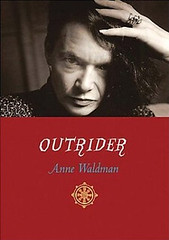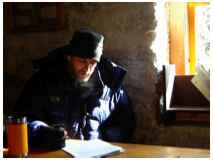Poetic Legitimacy, continued.
Thinking about the below Corbett comment about the professionalism scheme in contemporary poetry... This has been around since at least the 1970s, though it is certainly more acute today then it was back then. Everyone's gearing up for their stint in some experimental PhD factory, and then there are those actively developing even more and more "accurate" MFA ranking systems. This all strikes me as an endless round of bullshit. Certainly, some folks are genuine scholars, and these people should go to school. And others—through luck, happenstance, being in the right place (a la Creeley)—will end up with high-paid university jobs. However, the great majority out there should stop worrying about their CVs and get a job or go on the road or marry rich or start a commune or be okay working at the post office.
When I was a student at Naropa of all places, it struck me as particularly odd that many MFA students obsessively talked resumes and CVs and about possible professorships at this or that place. Even in the hallowed sanctum of the Jack Kerouac School of Disembodied Poetics—the very birthplace of the Outrider Tradition—there were many students jockeying for a leg up on the ladder toward a writing career. After a long day at school or night spent working at the writing center, I remember standing in the entrance to the Allen Ginsberg Library and staring at Ginsberg's huge impressionistic painting of Kerouac and feeling old Jack rolling in his grave. Nothing, I thought, could bring him less joy.
Aside from an emotional bad taste that all this careerism and self-promotion leaves in my mouth, I think there are two good reasons to avoid getting wrapped into the type of free-market competitiveness and poetic professionalism that has developed over the years: the first is an admittedly weak dualistic argument; the second is a more fundamental question concerning the role of poetry. Being a true-blue Naropa kid (via an even more crunchy UC-Santa Cruz) who literally gave up all his possession's (minus a locker full of books and a laptop) and lived in the woods for two straight years in college and spent a lot more time with organic farmers, bike messengers, and wildlife biologists then poets before entering grad school, I went to Naropa, not on some career path, but to answer a specific question—"How do you write, not about, but as nature?" I went to Naropa because Andrew Schelling and Jack Collom taught there and because I might get a chance to meet Anne Waldman, Joanne Kyger, and Gary Snyder (all of which I was able to do). While at Naropa I became good friends with Michelle Pierce, Tyler Doherty, Ronnie Corpuz, Ryan Gallagher, and Derek Fenner. I was given the chance to work as a writing tutor and to teach writing workshops through the Naropa Writing Center. I was also given the chance to work as the managing editor of Bombay Gin #27. In a sense, grad school at Naropa was an apprenticeship, an opportunity to meet elders on the same path, a chance to pose and answer a very complex and interesting question, and more than anything else, a chance to develop a sense of poetic lineage. Poetic lineage is not something that most poets talk about (particularly the School of Quietude poets), but at Naropa, lineage was stressed. Anne Waldman reminded us on more than one occasion, "You are connected to all those that came before and that will come again." (Anne probably used much more interesting words like "charnel ground" when talking about this, but it's been awhile). Anyway, Naropa's lineage is the "Outrider" lineage. This is the one connecting all people of all times and places who stand apart from and resist the mainstream, oppressive power structures and who are working toward an ecology of mind, peace in the world, and equality for all sentient beings. This "stance toward reality" (to quote Olson) is a priori outside of the academy and all notions of careerism. In Outrider, Waldman puts it this way,
Poetic lineage is not something that most poets talk about (particularly the School of Quietude poets), but at Naropa, lineage was stressed. Anne Waldman reminded us on more than one occasion, "You are connected to all those that came before and that will come again." (Anne probably used much more interesting words like "charnel ground" when talking about this, but it's been awhile). Anyway, Naropa's lineage is the "Outrider" lineage. This is the one connecting all people of all times and places who stand apart from and resist the mainstream, oppressive power structures and who are working toward an ecology of mind, peace in the world, and equality for all sentient beings. This "stance toward reality" (to quote Olson) is a priori outside of the academy and all notions of careerism. In Outrider, Waldman puts it this way,
"I felt the need to define the lineage, pedagogy, and view of a burgeoning poetics program that was increasingly seeing itself outside of the official verse literati culture academic mainstream. ...This seemed a counter poetics resistant to, au rebours "institutionalization" of creative writing. ...That resisted the domination of the literary mafias of New York and Chicago and San Francisco. ...As a temporary autonomous zone. As a bohemian community."
The point is—and this is what I think Corbett is hinting at below—that careerism is part of the dominant social paradigm that writers writing out of a New American Poetry lineage need to resist. It's like living in suburbia and driving an SUV while simultaneously writing articles for the Sierra Club newsletter. Somehow, this has become accepted practice. For some reason not enough poets of this lineage have stood up and called people out for this. Certainly, being post-avant with your writing and neoconservative in your intentions produces an interesting flavor of Ben & Jerry's. But, I think someone named it a while ago. It's called, "Having Your Cake and Eating it Too."
Besides, this dualistic call for Resistance, my second reason not to take a long walk down short pier of careerism, I think, may be more important. In all this rushing about to prove themselves, a lot of poets I've seen loose site of why they write. Drawing from my experiences at Naropa, I have come to look a writing as a contemplative practice. Granted, most people don't look at writing this way. Some write to get laid. Some write to explain themselves. Some write to find themselves. Others to mess around with language. For me, though, writing is a part of a lifelong investigation of an experiencing I commonly think of as me. To make my point let me turn to Ginsberg:
“I’ve lately come to think of poetry as the possibility of simply articulating that, in other words, observing your mind, remembering maybe one or two thoughts back and laying it out. So in that sense it’s as easy as breathing because all you’re doing is listening to particulars, those particulars of what you were just thinking about.My question then becomes, how many younger careerist-oriented poets are asking these fundamental questions about writing and who "they" are and what "this" is. A few I'm sure, but in between this and that promotional tour for this or that chapbook and shout outs for other friends' writing and the back and forth bickering about so-and-so [granted, I do all this as well on occasion, and possibly, possibly this is actually a form of underground, non-corporate vitality... so maybe I'm missed the mark here in my own hypocracy], it seems that the fundamentals get fundamentally lost. And besides, it is literally impossible to try to get somewhere (i.e. further your career), while simultaneously acknowledging the relativity of space-time. To look at the question ecologically, you cannot pick one thing out (i.e. a goal) and try to obtain it, without creating an "other" — something that is not you, over there. We know, however, that the world simply isn't like this. The world we inhabit is a much more interesting and complex, inter-related system of which we both take part in and are a part of. As for poets... I simply wish we'd drop the careerist bullshit and get down to the tricky business of experiencing THIS, THIS, THIS in words. I think the world and the words (not that these are separate) would be better off for it. I'll end with another quote from Waldman:
Mind is shapely, art is shapely. It’s a question of knowing your mind. So the discipline, in a sense, would be having a mind and knowing it. And then when you’re writing, that writing will be interesting according to that actual mind.
First thought, best thought. That is to say, the first thought you had on your mind, the first thought you thought before you thought, yes, you’d better have a better thought, before you thought you should have a more formal thought—first thought, best thought. If you stick with first flashes, then you’re all right. But the problem is, how do you get to that first thought—that’s always the problem.”
"The examples of dismay are endless when much of the avant-garde reads as elitist, operating within very specific language and economic codes, and where the arenas are MLA conferences, literature and creative writing "departments," Barnes and Nobles bookstores and the like. 'Is being a poet about being "tenured?' one student [this student!] laments."

No comments:
Post a Comment